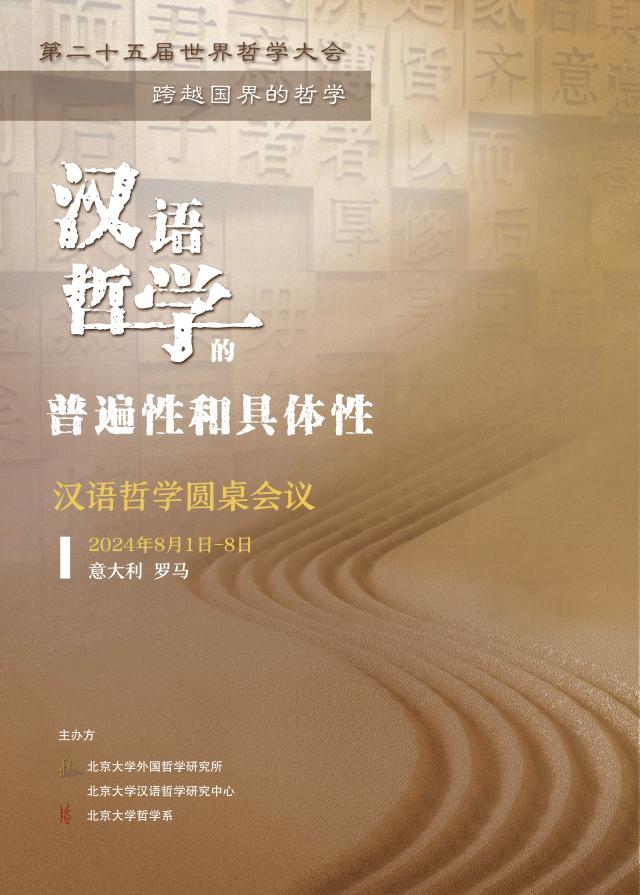2024罗马世哲会汉语哲学圆桌会议征文
2024罗马世哲会汉语哲学圆桌会议
暨第八届汉语哲学论坛
——汉语哲学的普遍性和具体性
会议征文
(The Universality and Specificity of Hanese Philosophy)
2024年8月1-8日,罗马
近十年来,汉语哲学成为中国哲学界一个强势崛起和迅速发展的学科和方向,已经进入当代中国哲学的各个领域。
汉语哲学既有其普遍性的使命,又有其独特的视域和问题。它的普遍使命就如任何其他语言的哲学一样,从事所有可能的哲学思考和研究;它独特的视域和问题则是要考察和研究如下一类问题:人类语言基本结构与汉语特殊形态之间的关系,与此相关,人类意识基本功能、结构和形式与其在汉语的若干具体和独特的表现。汉语哲学将揭示哲学思维的语际困境,而这种困境直接对真理、意义和存在等根本信念提出了挑战。于是,既探讨和揭示哲学思维和表达的汉语特征,又突破哲学的语际障碍,追求一般而普遍的意义和知识,正是汉语哲学为拓展现代哲学的问题、思路、领域做出的独特的贡献。
2021年,北京大学成立了中国第一个汉语哲学研究中心,由北京大学、复旦大学和浙江大学等校主办的“汉语哲学论坛”已经举办了七届。现在,汉语哲学也越来越引起海外学界的关注,其中一些学者开始参与上述论坛,并开展相应的研究。
为此,我们决定在第24届世界哲学大会举办汉语哲学圆桌会议,发起人为韩水法教授,Micheal Beaney教授和Sebastian Sunday Grève助理教授。本次会议旨在增进国际哲学界对于上述论题更为全面和系统的关注,并且贡献原创的观念。
本次会议采取线下论坛的方式(2024年8月1-8日,意大利罗马)汉语哲学圆桌会议时间计划为三个半天共六场,工作语言为汉语和英语。
我们计划在世界范围内邀请15名重要学者参加圆桌会议,就汉语哲学的问题、方法和领域进行专门的讨论,诚挚邀请在汉语哲学领域素有造诣的学者参会。同时,会议还将遴选优秀投稿论文参加。有意参会的学者请在指定时间内在世哲会网站(https://wcprome2024.com/)完成注册并办理相应的出国手续,参会费用自理。
投稿方式:感兴趣的学者请于2024年4月30日前将论文全文或1000-2000字/500-1000英文单词的详细摘要发送至:邮件题目为“2024ROME+学校+姓名”,并在邮件中注明您的姓名、单位、职称和联系方式。
主题:汉语哲学的普遍性和具体性
关键词:汉语哲学 意识 语际 普遍性 具体性
期待2024年8月在罗马相聚一堂、共同探讨汉语哲学普遍性和具体性问题!
北京大学外国哲学研究所
2023年12月30日

Round Table Abstract in English
The Universality and Specificity of Hanese* Philosophy
Philosophy, like science, is based on and conditioned by general human reason and rationality. The objects under philosophical investigation are also general in nature. In other words, philosophy, as universal thought, is a common rational activity realized through various human languages, rather than the privilege of any particular language. Therefore, any universal philosophical thought needs to be corroborated by different human languages. Hanese philosophy, as an essential and increasingly important part of this enterprise, has a universal mission, similar to philosophy in any other language. It engages in all possible philosophical thinking and research. Thus, the limits of Hanese philosophy are identical to the limits of human reason and rationality.
On the other hand, Hanese philosophy has its own unique scope and domain of research topics. It examines and studies the following issues: the relationship between the basic structure of human language and the special form of Hanese, and, in connection with this, the basic functions, structures, and forms of human consciousness, as well as its specific and unique manifestations in Hanese. Thus, Hanese philosophy reveals the interlinguistic dilemma of philosophical thinking, which has always posed a challenge to fundamental, philosophical doctrines about truth, meaning, being, existence, and more. Exploring and revealing both the Hanese characteristics of philosophical thinking and expression, and overcoming interlingual barriers to pursue general and universal meaning and knowledge, are the unique contributions of Hanese philosophy to expanding the domains, ideas, and fields of modern philosophy.
* The term “Hanese” is commonly translated as “Chinese,” which is not the most accurate translation in the current context of philosophical studies. It is more appropriate to directly translate it from its Chinese terms “汉语” or “漢語,” resulting in the English term “Hanese.”
Topic:
The Universality and Specificity of Hanese Philosophy
Keywords:
Hanese philosophy, consciousness, inter-language, universality, specificity
Agenda:
There will be three sessions, each lasting for two hours, held on three consecutive mornings. The number of participants in each session will range from 15 to 20 people.



